
Atlas F1 Magazine Writer
Toyota publicly stated, before the start of their second season in Formula One, that they are no longer aiming for mere respectability - they now want to finish consistently in the points. But following a lackluster opening to the season, they began to think that maybe the target needs to be adjusted. Barcelona, the track they know so well, was going to be their true test. To a large extent, Toyota passed it with flying colours. Atlas F1's David Cameron spent the last couple of races with the men from Cologne, talking to the drivers, engineers and team management. This is what a sophomore F1 team looks like before and after a successful exam
"Challenging competitively for points on a regular basis in 2003" - that was the target Toyota team chief Ove Andersson set at the launch, some four months ago, for the Japanese car maker's second year in Formula One.
But the first three races came and went, and there were no points to show for their work. In fact, there were hardly any race finishes at all. And should they fail at Barcelona - the venue they know so well - they'd have to re-adjust their targets of four months before.
But first, before Barcelona, they had to face the challenge of Imola.
Imola
People like to think of Toyota as the corporate suit of Formula One, as the guys who went racing because someone in the Japanese head office decided it would be good for sales and released the funds to do it, making sure all the while that their suite in the Paddock Club was well stocked. This view conveniently disregards the fact that Toyota has won the CART championship, is competing well in IRL, and dominated the World Rally Championship for years. You don't win this much, and in such diverse championships, simply as a function of marketing. The men building the Toyota Formula One team are racers first and foremost - they know the hard work involved in building a team from scratch and are realistic about their expectations in the short term. But long term they are here for one reason alone - to win.
Having put down the foundations of the team, this year's objective is to move forward, and there is no question that this is happening. The team is trying to emulate the in-house training regime of Williams - a team famous for decades as a hotbed of engineering talent - and bring their staff up as they progress. There are strong signs that this is being achieved, without recourse to stealing staff from the other, more established teams as would have been expected from a start up endeavour.
The car is definitely fast - the speed traps at the races so far have shown the astonishing speed that Toyota TF102 has - although it has suffered from some unreliability. Olivier Panis, the genial Frenchman who joined the team at the end of the season last year, bringing with him his renowned testing abilities to the young team, agrees and approves of the car to date. "We have the speed," Panis confirmed at Imola, "and that is the most important thing, to be honest. I prefer to have the speed and then take a little bit of time to fix all the problems we have and to carry on during the season. Because if we have a bad car when you start the season, it means the season is already gone."
Bringing Panis on board was a smart move - he has been fast throughout his career, but more importantly his time as a tester for McLaren showed that he is one of the few current drivers who can actually appreciably improve a car's performance over a season. Now in the twilight of his racing career, the move to Toyota is shrewd for both team and driver - he can push the car forward (as well as provide a mentor for the team's new driver Cristiano da Matta), and he can also stay in the sport he loves for a few more years (Panis holds a two year contract with the team).
Sitting in the Toyota motorhome under the Imola sunshine, Panis is clearly a happy man - he is at home with the team, and it shows. "I feel very positive about the team," he smiles. "I think we have a very nice factory, a very nice team to do well. The base of the car we have this year is very promising - okay, we haven't proven it yet, but I think we have a very good package. Definitely I know we have a lot to do to continue to carry on; to improve the car, to improve the people, to give them more experience. But I think we are in the right direction."
This is obviously a concern for a young team like Toyota. Success breeds success, and bringing points home can only improve the morale for the relative newcomers back in the factory. "We have some good people, like Gustav Brunner, and we have some very good people in the wind tunnel, and they know very well Formula One from the past," says Panis. "We have some very good people, very good and with experience, but definitely we need to grow up with everyone. And sometimes this is not easy to do, but it's why they employed me also."
Another reason they employed Panis was to provide a proven benchmark in the car to gauge the achievements of da Matta, the 29 year old Brazilian who was brought into Formula One after winning the CART championship with Toyota last year. There were question marks about this decision when it was announced, but Panis believes the young driver is proving it was the right one to make. "I think he's on the right way," Panis says. "He is definitely working a lot, because he (has to) learn the circuits, learn many things in Formula One. But I think we continue to put everything together, and I think we show something to everyone that we are competitive. I have a very good relationship with Cristiano, and I'm sure he's there. Cristiano knows very well the team and the car, and he has some good results."
DC: I remember you saying you drove last year's car…
Panis: "It was a disaster."
DC: How does it compare to this year's car?
DC: The aero is just much better?
Panis: "Oh yes, a lot. I mean, it is just 2-seconds a lap quicker. But we simply have to continue to improve the car's aerodynamics and downforce like everyone, we need to improve. We have a very good engine, but we need to continue improving it during the season. I think everyone is very concerned and very concentrated to that."
DC: It seems the improvements made with the engine in the off-season were essential
Panis: "It has improved, yes - performance wise, driveability. It is just a really good engine. For me, I think Toyota is one of the best engines on the grid. I don't know - this season it is difficult to know - but I think I would put maybe BMW on the top and Toyota not too far behind. But I think our engine is in front of Ferrari's and Mercedes's."
Andersson is more conservative in his thoughts on the matter. "I'm normally very careful with my judgment on that," he states. "I think that I am quite happy with the car itself - the car is definitely much, much better than last year's. Taking everything into consideration, last year we were 3.2 seconds off pole position, and now we are 1.1 or something like that."
Andersson's stylish rectangular glasses under his shock of white hair, and the mischievous smirk which is never far from his face, lend him an air of affability at odds with his role as team principal in charge of one of the largest teams in the paddock. The team members clearly love him, and there is great respect too for the man who built the team from the embers of Toyota's massively successful rally team. Andersson is the only man in the racing team referred to as Mister in a team full of people who refer to each other by their first name.
In Imola, Andersson was upbeat about his team's prospects for the future, even if the season hasn't shaped up quite as planned. "Well so far it hasn't been shaping up at all!" he exclaims, laughing, his heavy shoulders shaking with mirth. "We had the silly problems in Australia and Malaysia with the fuel pressure. Yesterday here we had a struggle, and we'll see tomorrow what kind of fuel loads people are running, but I think considering the situation I am quite happy."
DC: Do you think the aerodynamics have improved?
Andersson: "A lot, a lot, a lot."
DC: Is this something you have focused on, or is it something that has come with running in Formula One for a year?
Andersson: "For me, aerodynamics is the most important thing in Formula One."
DC: So what do you think can be further improved on the car?
Andersson: "Aerodynamics is still, I think, our weakest area. There can be some small improvement through mechanical testing, maybe, but where we can gain a lot is aerodynamics."
From the outside it can appear that the team is run as a corporation rather than a racing team, with an increased management structure announced at the new car's launch earlier this year. Andersson agrees, noting that it's the Japanese way of doing things, and it is something that he has become used to over the year. This approach is at odds with most of the paddock, which has traditionally had one or two people at the top, allowing for a faster turn around of ideas. "This is something that we will have to see," Andersson comments, laughing, "and I wouldn't like to make a statement in the press about this - I might have my own opinions on this, but I keep them to myself!"
The San Marino Grand Prix on Sunday saw the team bring both cars across the finish line for the first time this year - a clear sign that progress was being made, although no points were forthcoming. The team was not changing their focus for the year just yet. "I think our target has to be the one we started with," Andersson affirmed after the Imola race. "Okay, we have failed in the first three races, but we have a new aero package coming for Barcelona which should give us some tenths. We looked at it in the wind tunnel, and we will try it in reality next week.
"So come to Barcelona and if we haven't changed there, then I suppose we can back down from [the statements we made] when we launched the car."
Barcelona
On Friday in Barcelona the drivers brought back the team's best qualifying performance ever - fourth and sixth - with Panis maintaining his sixth place on the grid in the following day's qualifying session. Da Matta was less lucky, only managing 13th on the grid, which Toyota's team manager Ange Pasquali attributed to massive oversteer picked up on his hot lap.
"We have worked a lot, and we have overcome a lot of problems, but it is never enough and you always pick up new problems," Pasquali begins. "This is the building up of experience. But we still have a lot of to do, because Formula One is a world which is moving extremely quickly, and this is something you have to always bear in mind. We have cured some problems but we still have to improve on Fridays - we have to be quicker in [finding] the correct set up on Fridays, and this comes with experience, especially when now Free practice is only one hour.
"So this very important - we have a young team but people are pretty switched on. I have to say that at the moment we have done four Grands Prix, and of these four GPs we had four times the correct strategy. We were not perfect - because we weren't quick enough or we had problems, like fuel feed or other problems - but at least we know we got it right, and this is quite encouraging for the future because we hope that when we've got the speed that everything is going to match together and we're going to come out with something nice."
Along with everyone else, Pasquali points to the car's engine as its strongest asset. "I think the engine has improved a lot," he confirms. "The engine department is very strong, and (engine department general manager) Luca Marmorini is really on top of everything. So it has improved a lot, and the drivers are very happy. Okay, last year there were different drivers, so this year it is difficult for them to compare in a race condition, but according to the winter test they are quite happy with the engine - the evolution has been good."
The aerodynamics are clearly the weakest point of the car, but Pasquali sees strong progress in this area over the team's short history. "The aerodynamics is a big improvement," he states. "If you compare last year and this year, it's night and day. I think our aero department is doing a good job. Of course, as I said, Formula One is a fast world, and you're never quick enough in terms of new parts and new ideas, you're never quick enough. But we're satisfied at the moment; at least we're on the right direction."
And the progress Toyota has made in such a short period is remarkable, although the lack of points was clearly a worry for the team. On Saturday at Barcelona everyone at Toyota was looking forward to the race, and Pasquali summed up their expectations: "We want to be in the top eight at the end and to score that first point. In fact, I think it wouldn't be unrealistic to say a top six finish… A top six would be plausible, would be reasonable. But a top eight will be already a big satisfaction because it means we will come back to the factory with something to give to our people."
DC: What do you think Toyota is aiming for at the end of the year?
DC: And if this podium was to happen, where would it be most likely?
Pasquali: "Well, I don't know where it would be, because it is difficult to make estimation, but as soon as possible would be fantastic! Otherwise, I think Monza could be the place."
DC: Because it's a power circuit?
Pasquali: "Yes - Monza could be one of those, and Hockenheim shouldn't be bad either. I would have said Spa, but it's not on the calendar anymore. And why not Suzuka? Of course, Suzuka would be fabulous because it would be at home, but if it could happen earlier it would be nice as well. Either way, at the moment we have to concentrate on keeping the line, you know, and stay within the line, which is the line of the learning curve, and make sure that we correct at every Grand Prix the mistakes we have made in the one before."
Toyota indeed are learning from their mistakes. For example, the fuel feed problems of the first two races have been solved. And with both cars making it to the finish in Imola - and both drivers putting an impressive performance in Friday's qualifying - expectations were running high at the Toyota Spanish motorhome come Saturday afternoon.
"We were very happy with Friday's qualifying times," enters Richard Cregan, general manager of Toyota's F1 operations, "because Friday's more a true reflection of the car's performance than Saturday, since everyone is preparing for the race and you never really know. So yesterday we were really pleased - we had a few things to sort out because we had a new aero package on the car, and we were trying different things and working closely with the factory. But by yesterday afternoon obviously we were very happy, especially with Cristiano's performance, because it was good for him to finally outpace Olivier. So psychologically as well it was really good."
Cregan has been with Toyota Motorsport since 1984, working his way through the ranks of the various programs the team has run from his start as a mechanic to becoming the right hand man for Andersson, and it's clear that he loves the company that took him from his native Ireland to Germany, and which has been his home for almost two decades. His day job is to essentially maintain communication channels through the company, and with over 600 employees this is no mean feat. This means, though, that race weekends could essentially be seen as a sort of break, a chance to weigh up the achievements of the team so far and how they can improve.
"I think you have to look at our car overall as a package," Cregan begins. "Our engine is very, very strong. I think we have a lot of work to do on our suspension, and our aero is the biggest area for improvement, because of the amount of work you need to be doing just to keep up with everybody else. There's still a lot of potential in the car for the aero side, and I think by the next couple of races we'll hopefully see that."
A vital aspect of any modern F1 team is the work process, running new parts through the factory. It's not a sexy subject in comparison to the on track activities, but one that Cregan sees as essential to the team. "That's where we have to improve," he states. "I said this in the beginning, when we started with the team two years ago: if you want to be successful in Formula One you have to maximise that ten-day period between races. You need to be able to go back on a Sunday night after the race and literally have something new going on the car the following Friday, whether it be aero or a suspension part or something like that.
"We're not doing that as yet, but that's what we have to achieve. Because if you don't achieve that you're not going to be a winner, or at least you're not going to be a sustainable winner - you might win the odd Grand Prix, but I think to get up there with the other top teams, like Ferrari or Williams or McLaren, and be consistently good, then I think that's where the effort to reach is enormous. And by far we haven't reached that yet."
He's very direct on what needs to be done within the team to reach this point: "I think we're probably weak on the technical side, in the sense of having only one direction. I think we need to work on that. We need to improve our approach, our development. But we recognise this, which is the first step to getting it right, and we've made some changes in the company as to how we do things. And we're seeing the benefit of it now."
"I also think that what makes us a little bit top heavy is, obviously, being affiliated with TMC. You're obviously going to have a big input [from the mother company] to see what we're doing, because we're spending their money, and so they have to keep an eye on things. I think we're probably top heavy in the sense of pure management, but when it comes to technical ability or technical management, that's an area we have to work on, and I think we're probably weak there."
Which is an obvious dilemma for a young team such as Toyota: it is better to go on a shopping spree and pull in staff from the other teams, or to build up from within? The only high-profile member of staff to come from another team is chief designer Gustav Brunner, who was lured away from Minardi among much acrimony and threat of lawsuits.
"Well we're certainly trying to build people up from within," Cregan comments. "We feel that that's the way to build success in the long term. You will always have to review what kind of ability you need to bring from the outside - that's always under review - but I think that if you want to be successful long term then you have to build success within the company, and what John is trying to do at the moment is to work from within, with the people that we have, and then obviously in the case of necessity to bring in knowledge from outside the company."
It's a difficult balance to find - any new team will take time to work well together, but at the same time there is undoubtedly pressure from the team's parent for success. "I think we're faced with a paradox in that sense," Cregan confirms. "We want to build a home-grown F1 team, while Japan wants success as soon as possible. Those things are running in parallel, and it's a matter of how you manage it, and the perspective of the media outside, and at the same time what we're expecting from ourselves and the length of time we think it's going to take.
"Formula One is a tough business, and I think so far we haven't done too badly. We're only in our second season, but the expectations have certainly risen this year - you can feel it - and obviously by the end of the season we're going to have to provide continuous results."
DC: How is Cristiano fitting in? Is he up to speed with everything as far as the team is concerned?
Cregan: "Yes, no problem. He's very good, and there's a very good relationship between himself and Olivier - I think in many ways Olivier has been his mentor into F1, and he's helped him a lot, a lot more certainly than he would need to [help] in a normal situation - and this has paid dividends because now they're working very close together on the car, and that's helping us as a team as well."
DC: With a new driver there is a period where you have to see if you can trust his testing feedback, and so on. Is he past that stage now?
DC: Although he's had the pace in the races, it didn't seem to come in qualifying, and that seems to be turning around a little bit for him now.
Cregan: "Yeah, I think the big thing with qualifying is, you know, whereas in the past you had your twelve laps, so you had basically four chances at a good lap, and then you were able to tune your car, tune your suspension, work on your tyres, but now it's basically you get one shot at it, and the guys have to be physically and psychologically ready, and that's not always the case with a lot of the drivers. I think we're working on that as well, the same as a lot of other teams, in how to prepare the drivers for this one-lap qualifying."
Cregan agrees with Pasquali that the power circuits will be an advantage for the team, but he suggested that there could be some surprises in store over the season. "Well we made a lot of comments last year, and it ended up that the tracks that we thought we were going to be weak on, we were strong on" Cregan laughs. "You know, at Monaco last year we had a great run with Allan [McNish], and I think Olivier, having won there in the past, is very strong there. Our car at the moment is maybe weaker than we'd like in the aerodynamic area, so maybe we can do something in places like Monaco or Montreal, I don't know. But we want to be regularly finishing in the points wherever we go - that's our target.
"I mean, we certainly have the same goals, where we want to be a regular points finisher this year, and you know, we want to fight for a podium position - that's our big target this year, and still is - we haven't changed that. We've reviewed how we're approaching it, and we have changed a few things along that line, but the target's still the same."
The acid test of Barcelona was a success - Cristiano da Matta brought home three points for his run home to sixth place, and Panis was unlucky not to have brought some more back to the team. When da Matta walked back to the team's motorhome the other Toyota members surrounded him, clapping him on the back and hugging him like a family would do to a son who had done well in his exams.
DC: Just how good is this car?
DC: You've had a few problems; nothing major with the car, but just things that have happened - do you think that you've got through the back of that now?
Da Matta: "Well I think if you consider the last three races, in Interlagos, Imola and here, then we didn't have - apart from pure performance problems - we didn't have any mechanical problems, we didn't have any little thing that mess up our performance. So I hope that on the reliability side we have these things sorted out, and we have to keep pushing."
DC: Do you think this changes any goals for Toyota, or for you yourself?
DaMatta: "I think it's a natural process of improvement. I think we cannot rush it. The team is only in its second year. But I think it's great to get a sixth-place finish. In fact, I'm very upset that we didn't beat the team's previous best result, but this result today happened because of our performance, it happened because we were quick, not because we were lucky or anything."
Cregan was walking around the paddock like a proud father after his first child has been born, a smile spread wide across his face, and the constant phone calls he received from various well wishers is a reminder of that too - all he needed was a large cigar to complete the picture. He was proud of the team as a whole, but particularly of da Matta.
"You know," he says, "it's ironic because I was talking to you the other day, and I was just saying that this will be the start of Cristiano's F1 career. And I really felt that, because of all the testing that he's done here. He was confident before the race, and it's great for him. A lot of people ask when a driver comes over from the USA if he's able to hack it, but Cristiano showed it today - he's able to play with the best of them.
"I don't know if you're aware that Mr Akuida is here, and Mr Toyota is here. So obviously it's points at the right time for that, you know. From that point of view it's right timing - this is our fifth race, and we kind of said to ourselves this year that we wanted to be constantly scoring points. We were pretty disappointed with the first three results mainly, and to be able to get some points after finishing in Imola, it's a step.
Among all the partying at the Toyota motorhome, Gustav Brunner was a notable absentee, having stayed back at the factory to bring further aero improvements to the upcoming races. Still, there is plenty of work to be done. "On the high speed tracks we've certainly got the power, but we're not great in low speed corners, we're not able to carry the speed through, and I think that really sums it up for us," Cregan says.
This will be the focus of testing for the team for the remainder of the year. Toyota have a heavy testing schedule, and Ricardo Zonta has been brought in this year to help the race drivers with the workload. "Basically you're looking at every second week you're out testing," Cregan confirms, "which is a heavy schedule for the drivers. We have Ricardo as a test driver, and that's working out really well. You have to be careful not to overuse the race drivers, as you have a heavy race weekend and then they go off straight into a test.
"But now that we brought forward our aero package, we have a few other little bits and pieces up for testing, to hopefully try and help for Austria. Obviously we're working on Austria and Monaco at the same time, so we have to be sensible, but if we can consistently finish in the points in the next few races, we should try and build on it. I think if you get a result where you get a few points you just have to use it as a springboard, and if you fail to do that you lose a big opportunity to move on, really."
Clearly, Toyota are going to do just that. They have the budget, the personnel, the drivers and the equipment to push further up the grid, and it is only a matter of time before they do. On qualifying performances alone Toyota is on par with many of the more established teams on the grid, and their results in Imola and Barcelona show they are working through the reliability problems they suffered earlier in the season.
The speed was already there, and now reliability is catching up - it's only a matter of time before the big boys at the other end of the paddock will be worriedly looking in their rear view mirrors at the red and white cars from Cologne.
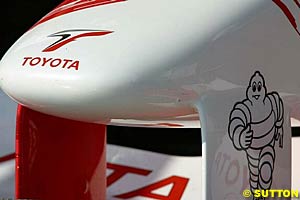 Barcelona was always going to be the acid test. They've done so much testing at the Circuit de Catalunya that the drivers know the track like the back of their hand, and the engineers could find the right setup blindfolded. Most of the teams have the same advantage, though, so there was a chance it could be all for nothing.
Barcelona was always going to be the acid test. They've done so much testing at the Circuit de Catalunya that the drivers know the track like the back of their hand, and the engineers could find the right setup blindfolded. Most of the teams have the same advantage, though, so there was a chance it could be all for nothing.
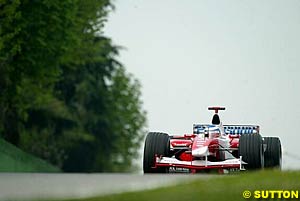 Last year's debut was a success on their terms. Andersson, the avuncular team principal who has built the Formula One team from the remnants of the old rally team, described their objectives on debut as competing without embarrassing themselves, an objective which was achieved by the two sixth placed finishes the team brought home over the season. Last year's car was an inherently conservative one, with an unadventurous aerodynamic package surrounding an engine which impressed the paddock from day one.
Last year's debut was a success on their terms. Andersson, the avuncular team principal who has built the Formula One team from the remnants of the old rally team, described their objectives on debut as competing without embarrassing themselves, an objective which was achieved by the two sixth placed finishes the team brought home over the season. Last year's car was an inherently conservative one, with an unadventurous aerodynamic package surrounding an engine which impressed the paddock from day one.
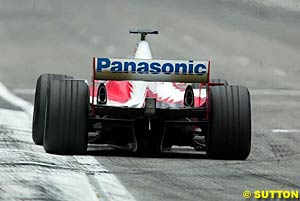 The team suffered earlier in the year from a number of problems on the car, primarily fuel feed mishaps, which while not essentially mechanical in nature have contributed to an image of unreliability in the eyes of the public. "It is little bit of a shame, because we don't have some big problem," Panis says. "But if we fix the small problems we have, then we might score points quite quickly. After we score points I think it will be a big help for the people we have, and we can carry on with the rest of the season. I'm quite positive."
The team suffered earlier in the year from a number of problems on the car, primarily fuel feed mishaps, which while not essentially mechanical in nature have contributed to an image of unreliability in the eyes of the public. "It is little bit of a shame, because we don't have some big problem," Panis says. "But if we fix the small problems we have, then we might score points quite quickly. After we score points I think it will be a big help for the people we have, and we can carry on with the rest of the season. I'm quite positive."
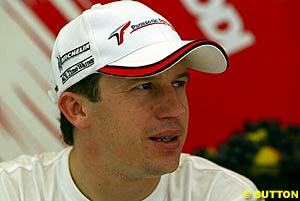 Panis: "Definitely some stiffness is different. The front and rear suspension this year is working much better, but it is just the downforce."
Panis: "Definitely some stiffness is different. The front and rear suspension this year is working much better, but it is just the downforce."
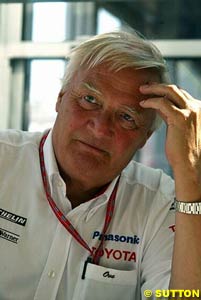 When discussing the car's evolution, Andersson is as moderate in his remarks as ever: "There are some small details, not a lot. But if you look at the whole car, then the engine has a little bit more power - we can rev it a little bit higher than last year's engine; this year we have a seven speed gearbox instead of a six speed gearbox; we have composite suspension in the front - last year we didn't have that. I mean, it's a lot of small details - we can't really say we have another 20 horse power more, you know, but I think it's a general improvement of the package."
When discussing the car's evolution, Andersson is as moderate in his remarks as ever: "There are some small details, not a lot. But if you look at the whole car, then the engine has a little bit more power - we can rev it a little bit higher than last year's engine; this year we have a seven speed gearbox instead of a six speed gearbox; we have composite suspension in the front - last year we didn't have that. I mean, it's a lot of small details - we can't really say we have another 20 horse power more, you know, but I think it's a general improvement of the package."
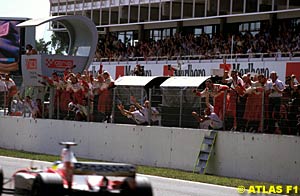 Pasquali has been with Toyota for over ten years, working in team management on the WRC and Le Mans projects as he moved up the ranks and becoming the general manager of the logistics department in 1997, which meant that a large part of the responsibility of building the F1 programme and facilities fell on his shoulders. The Corsican's enthusiasm for team is obvious - it's been such a big part of his life for so long now - and he was only too happy to talk at length about where he felt the team was headed, on a stiflingly hot Saturday after qualifying, fielding phone calls from Carlos Sainz and juggling queries from the team as he did so.
Pasquali has been with Toyota for over ten years, working in team management on the WRC and Le Mans projects as he moved up the ranks and becoming the general manager of the logistics department in 1997, which meant that a large part of the responsibility of building the F1 programme and facilities fell on his shoulders. The Corsican's enthusiasm for team is obvious - it's been such a big part of his life for so long now - and he was only too happy to talk at length about where he felt the team was headed, on a stiflingly hot Saturday after qualifying, fielding phone calls from Carlos Sainz and juggling queries from the team as he did so.
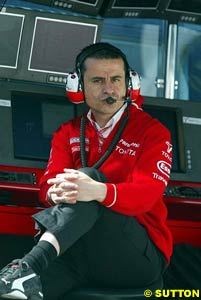 This is something that everyone at the track comes back to: bringing back some points to the factory to help them improve their morale, to give them something to have faith in. "I think the morale is good," Pasquali notes, "because people see it boiling in the pot - it is there. So the morale is good because this keeps the people excited. Of course we were disappointed after Australia, after Malaysia, after Brazil, but this is instantaneous disappointment - when we are back at the airport it's finished, because we are already into the next race."
This is something that everyone at the track comes back to: bringing back some points to the factory to help them improve their morale, to give them something to have faith in. "I think the morale is good," Pasquali notes, "because people see it boiling in the pot - it is there. So the morale is good because this keeps the people excited. Of course we were disappointed after Australia, after Malaysia, after Brazil, but this is instantaneous disappointment - when we are back at the airport it's finished, because we are already into the next race."
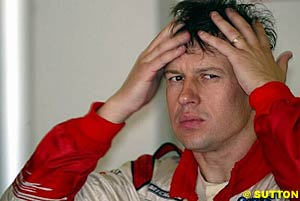 Given his position in the company, Cregan is ideally placed to comment on the perceived top heaviness of the management structure within the team. "Yeah, I think if you compare us to probably any of the other Formula One teams the words 'top heavy' does come to mind," he smiles. "But I think you have to bear in mind that we're in a transition period at the moment - we went through a lot of changes at the end of last year, and then (Toyota Motorsport president) John Howett came on board at the beginning of this year, and so obviously John has to have time to come in and review everything to see where he's going with the team. He's already started to do a lot of constructive changes within the company to make us more efficient.
Given his position in the company, Cregan is ideally placed to comment on the perceived top heaviness of the management structure within the team. "Yeah, I think if you compare us to probably any of the other Formula One teams the words 'top heavy' does come to mind," he smiles. "But I think you have to bear in mind that we're in a transition period at the moment - we went through a lot of changes at the end of last year, and then (Toyota Motorsport president) John Howett came on board at the beginning of this year, and so obviously John has to have time to come in and review everything to see where he's going with the team. He's already started to do a lot of constructive changes within the company to make us more efficient.
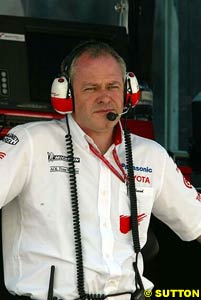 Cregan: "Yeah, no problem. I mean, in the beginning obviously he had to adapt to Formula One, and Olivier helped him do that. Obviously he's a very talented driver - that we know, or he wouldn't be here - but now he's really come into his own. I feel this weekend might be the start of his Formula One career as such, because he has outpaced Olivier, he has done very well. And the other thing you have to remember is that he's never driver on all the other circuits before, except maybe in Brazil, and so this Grand Prix is an acid test for him as well."
Cregan: "Yeah, no problem. I mean, in the beginning obviously he had to adapt to Formula One, and Olivier helped him do that. Obviously he's a very talented driver - that we know, or he wouldn't be here - but now he's really come into his own. I feel this weekend might be the start of his Formula One career as such, because he has outpaced Olivier, he has done very well. And the other thing you have to remember is that he's never driver on all the other circuits before, except maybe in Brazil, and so this Grand Prix is an acid test for him as well."
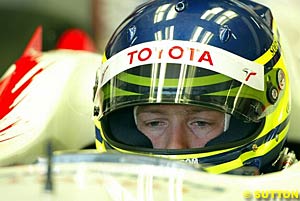 Da Matta himself was matter of fact about his achievement. "It feels good, happy - 3 points is 3 points, it gets us somewhere in the Championship," he said after the race. "Of course we need to keep on working, we need to keep on pushing - I think we've been a little bit with ups and downs in our car performance from track to track, and I hope we can continue to find consistency and just keep on working."
Da Matta himself was matter of fact about his achievement. "It feels good, happy - 3 points is 3 points, it gets us somewhere in the Championship," he said after the race. "Of course we need to keep on working, we need to keep on pushing - I think we've been a little bit with ups and downs in our car performance from track to track, and I hope we can continue to find consistency and just keep on working."
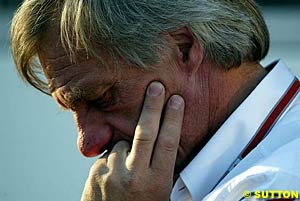 "So for the whole team it's a big motivation, especially since we pushed very hard to get an aero update here, which was initially meant to be introduced in Austria, so it's good for the guys in the factory as well."
"So for the whole team it's a big motivation, especially since we pushed very hard to get an aero update here, which was initially meant to be introduced in Austria, so it's good for the guys in the factory as well."
Please Contact Us for permission to republish this or any other material from Atlas F1.
|
Volume 9, Issue 20
Atlas F1 Exclusive
The Acid Test: Two Weeks with Toyota
Exclusive Interview with Craig Pollock
Giancarlo Fisichella: Through the Visor
Articles
Season in the Sun: Part II
Hype
Austrian GP Preview
2003 Austrian GP Preview
Austrian GP Facts & Stats
Columns
The Fuel Stop
The F1 Trivia Quiz
Bookworm Critique
On the Road
Elsewhere in Racing
The Weekly Grapevine
> Homepage |